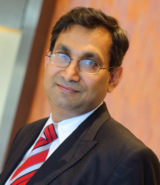Badrul H. Khan, Ph.D. is a world-renowned speaker, author, educator and consultant in the field of e-learning and educational technology. Professor Khan has the credit of first coining the phrase Web based instruction and popularizing the concept through his 1997 best-selling Web-Based Instruction book which paved the way for the new field of e-learning. Known as the founder of modern e-learning, Dr. Khan has been honored with many awards and worldwide acclamation throughout his career. In recognition of his unique contribution to the field of e-learning coupled with his services to worldwide e-learning communities, Egyptian E-Learning University Council on August 13, 2012 appointed Dr. Badrul Khan as an honorary distinguished professor of e-learning. Professor Khan is a United States Distance Learning Association (USDLA) 2015 Hall of Fame Inductee.
He served as the founding Director of the Educational Technology Leadership (ETL) graduate cohort program at The George Washington University. He also served as the founding Director of the Educational Technology (ET) graduate program at the University of Texas, Brownsville. He served as an Instructional Developer and Evaluation Specialist in the School of Medicine at Indiana University, Indianapolis. He received a B.A. in Chemistry and a Ph.D. in Instructional Systems Technology from Indiana University, Bloomington, USA.
While growing up in Chittagong, Bangladesh during the 1970s, Badrul Khan used to dream about having access to well-designed learning resources available only to students in industrial countries. In the ’70s it was unthinkable to have equal access to those resources. In the ’90s, with the emergence of the World Wide Web, Khan’s dream of equal access to quality learning resources became a reality. His desire for broadly available distributed learning systems and his scholarly grounding in the field of educational systems design and technology have enabled him to present a total vision for educational and training possibilities of the new worldwide communications technologies.
Through his teaching and publishing, Professor Khan has been instrumental in creating a coherent framework for Web-based instruction, training, and learning. In his first book, Web-Based Instruction, he took a leadership role in defining the critical dimensions of this new field of inquiry and practice at all levels of education. Reflecting its enormous acceptance worldwide,Web-Based Instruction has become a bestseller and has been adopted by over 350 colleges and universities worldwide. His second book Web-Based Training is a landmark book that covers all aspects of Internet’s World Wide Web for training at all levels.
He continues to advance the discourse in the field of distance learning. His contribution to the field of open and distributed learning is recognized throughout the world. As a result, his Managing E-Learning Strategies and E-Learning Quick Checklist books are published in several languages by several publishers located around the world. His 2007 book Flexible Learning in an Information Society includes case studies, design models, strategies, and critical issues encompassing the multiple dimensions of his E-Learning Framework. His publication plan is to author/edit eight different books using the eight dimensions of his e-learning framework. The books User Interface Design for Virtual Environments: Challenges and Advances , Learning on Demand: ADL and Future of e-Learning, and International Handbook of E-Learning are part of the plan.
A sought-after keynote speaker on e-learning and blended-learning, Khan is past President (1999-2000) of the International Division of the Association for Educational and Communication Technology (AECT). He delivered keynote addresses at the various distance learning conferences in the USA and abroad. He was one of the select few experts invited to a symposium on virtual education organized by the White House Office of Science and Technology Policy (OSTP). He served as a consultant/advisor to distance education and educational technology related projects at the World Bank, North Atlantic Treaty Organization (NATO), Asian Development Bank, US Federal departments, including Department of Education, Department of Defense, Department of Transportation, Department of Energy, Department of Labor, and Department of Health and Human Services; Ministry of Education in several countries, and academic institutions and corporations in the USA and abroad.
He interviews visionary leaders around the world who implemented technology based education in their regions or institutions for a regular column of the Educational Technology magazine entitled . He is a contributing editor of Educational Technology (USA), He previously served as a consulting editor of The International Review of Research in Open and Distance Learning (Canada) and The Arab Journal of Open Learning (Yemen), a member of the editorial advisory board of the eLearning Digest (UAE), a member of the editorial board of Distance Education (Australia), a member of the editorial board of Review of Education at Distance (Brazil), a member of editorial advisory board of Media and Technology for Human Resource Development (India), a member of the scientific committee of Journal of e-Learning and Knowledge Society (Italy), a member of the advisory board of International Journal of Learning Technology (UK), and a member of the advisory board of Indian Journal of Training & Development (India).

